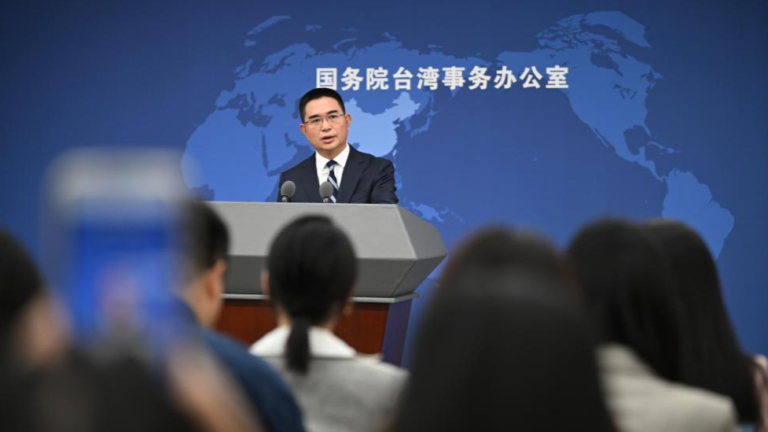
Indonesian and Vietnamese leaders said their countries expect to formally agree in 2025 on exclusive economic zone (EEZ) boundaries. The move not only settles a long-standing debate on the countries’ overlapping maritime territories, but it also presents a united front to oppose China’s expansive and illegal claims on the South China Sea.
The boundaries on which Hanoi and Jakarta agreed are part of the territory that Beijing arbitrarily claims in the sea, a conduit for trillions of dollars in annual global trade. China routinely claims waters in other countries’ internationally recognized EEZs, the area that typically extends 200 nautical miles from a nation’s territorial sea where the country has exclusive rights to marine resources.
For decades, the Chinese Communist Party has used coercion and force against neighbors including Indonesia, Malaysia, the Philippines and Vietnam as it tries to enforce maritime ambitions in contested waters. China continues to defy a 2016 international tribunal ruling that deemed its territorial claims invalid, even though Beijing, as a signatory to the United Nations Convention on the Law of the Sea (UNCLOS), is legally bound by the decision and the treaty’s maritime designations.
The Indonesia-Vietnam EEZ settlement also underscores the importance of international law and its utility for peacefully solving regional disputes, analysts say.
“For Indonesia and Vietnam, upholding UNCLOS matters because it enables them to assert their respective sovereign international maritime rights and to enforce their maritime interests,” Bich Tran, an adjunct fellow at the Washington, D.C.-based Center for Strategic and International Studies, wrote in 2023 for the East Asia Forum journal.
The countries reached an initial agreement in late 2022 that must be ratified by their respective lawmakers before taking effect. Indications that formal acceptance will occur in 2025 coincide with Hanoi and Jakarta elevating their bilateral relations to a comprehensive strategic partnership.
That upgrade will enhance cultural, scientific, economic, security and defense cooperation, according to the state-run Vietnam News Agency. The nations agreed to strengthen information sharing, search and rescue coordination, and defense industries, as well as to develop joint military exercises and patrols.
Indonesia and Vietnam also emphasized the importance of maintaining stability and freedom of navigation and overflight in the South China Sea, as well as the need to avoid the threat or use of force, uphold UNCLOS and refrain from actions that could undermine peace in the region.
Vietnam also upgraded its diplomatic relations with Singapore in March 2025 and New Zealand the previous month. Those promotions follow comprehensive strategic partnerships forged with Australia, Japan, Malaysia, South Korea and the United States since 2022.
Meanwhile, Philippine and Vietnamese officials have said they are ready to negotiate overlapping claims to the continental shelf in the South China Sea. “Both the Philippines and Vietnam agree that the way to move forward … is for dialogue and consultation,” Jonathan Malaya, the Philippine National Security Council’s assistant director general, said in July 2024, according to The Philippine Star newspaper.
The recent agreement between Indonesia and Vietnam to delineate their Exclusive Economic Zones (EEZs) in the South China Sea is being hailed as a significant step towards upholding international law and sending a strong message to China regarding its expansive claims in the region.
Upholding International Law:
- The agreement, reached after 12 years of negotiations and expected to be ratified in April 2025, is based on the 1982 United Nations Convention on the Law of the Sea (UNCLOS). This is a crucial point, as UNCLOS is the internationally recognized framework for maritime boundaries and rights.
- By clearly demarcating their EEZs, Indonesia and Vietnam are asserting their sovereign rights within the 200 nautical miles extending from their respective coastlines, as defined by UNCLOS.
- This agreement serves as a precedent for other ASEAN countries with overlapping claims in the South China Sea, demonstrating that disputes can be resolved peacefully and in accordance with international law.
Sending a Message to China:
- China’s “nine-dash line” claim, which encompasses a vast area of the South China Sea, overlaps significantly with the EEZs of several Southeast Asian nations, including Indonesia and Vietnam.
- The Indonesia-Vietnam agreement implicitly rejects the legitimacy of China’s claim within their respective EEZs, as it establishes boundaries that do not align with the nine-dash line.
- This united stance between two significant ASEAN members strengthens the collective voice of the region in opposing China’s assertive actions in the South China Sea.
- The agreement also highlights the importance of international law in resolving maritime disputes, a principle that China has often disregarded in its pursuit of its territorial claims.
Broader Implications:
- The successful resolution of the Indonesia-Vietnam EEZ dispute could pave the way for similar agreements between other claimant states in the South China Sea.
- A united front among ASEAN members based on international law would put greater pressure on China to negotiate a Code of Conduct for the South China Sea that respects the rights and interests of all parties involved.
- This agreement also has economic benefits, as it clarifies fishing rights and facilitates potential joint development of resources in the region.
In conclusion, the Indonesia-Vietnam EEZ deal is a significant development in the South China Sea dispute. It not only upholds the principles of international law but also sends a clear message to China that its expansive claims are not recognized by its neighbors and that disputes should be resolved peacefully and in accordance with established legal frameworks.








